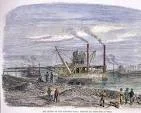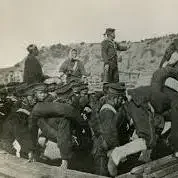-
 The Opium Wars were fought between China and European powers. The main source of conflict was that British traders insisted on supplying opium, and the Chinese government resisted
The Opium Wars were fought between China and European powers. The main source of conflict was that British traders insisted on supplying opium, and the Chinese government resisted -
 The Treaty of Nanjing ended the First Opium War between China and Great Britain. The treaty forced China to open its ports to Western traders and ceded Hong Kong to Britain
The Treaty of Nanjing ended the First Opium War between China and Great Britain. The treaty forced China to open its ports to Western traders and ceded Hong Kong to Britain -
 The 193.30-kilometer-long (120.11 mi) canal is a key trade route between Europe and Asia. In 1858, French diplomat Ferdinand de Lesseps formed the Compagnie de Suez for the express purpose of building the canal. Construction of the canal lasted from 1859 to 1869.
The 193.30-kilometer-long (120.11 mi) canal is a key trade route between Europe and Asia. In 1858, French diplomat Ferdinand de Lesseps formed the Compagnie de Suez for the express purpose of building the canal. Construction of the canal lasted from 1859 to 1869. -
The Meiji Restoration was a political revolution in Japan in 1868 that restored imperial rule and ended the Tokugawa shogunate. It marked the beginning of the Meiji era, a period of rapid modernization and Westernization
-
The Second Industrial Revolution, occurring roughly between 1870 and 1914, was a period of rapid technological advancement marked by the mass production of goods using new power sources like electricity, widespread adoption of steel, and innovations in communication like the telephone. This led to significant urbanization and changes in global society, including the development of automobiles and improved transportation systems like railroads.
-
 The Berlin Conference of 1884–1885 was a meeting of colonial powers that concluded with the signing of the General Act of Berlin,[1] an agreement regulating European colonisation and trade in Africa during the New Imperialism period. The conference of fourteen countries was organised by Otto von Bismarck, the first chancellor of Germany, at the request of Leopold II of Belgium.
The Berlin Conference of 1884–1885 was a meeting of colonial powers that concluded with the signing of the General Act of Berlin,[1] an agreement regulating European colonisation and trade in Africa during the New Imperialism period. The conference of fourteen countries was organised by Otto von Bismarck, the first chancellor of Germany, at the request of Leopold II of Belgium. -
The Scramble for Africa is the name given to the way in which European countries brought nearly all of the African continent under their control as part of their separate empires. The Scramble for Africa began in the 1880s. By 1914 the only African countries not controlled by a European power were Liberia and Ethiopia.
-
 The Fashoda Incident was a diplomatic crisis between Britain and France in 1898. It occurred in the small town of Fashoda, located on the White Nile in what is now South Sudan. The incident was the result of imperialist territorial disputes between the two countries over Africa.
The Fashoda Incident was a diplomatic crisis between Britain and France in 1898. It occurred in the small town of Fashoda, located on the White Nile in what is now South Sudan. The incident was the result of imperialist territorial disputes between the two countries over Africa. -
 The Boer War, also known as the South African War, was a conflict fought between the British Empire and the two Boer republics in South Africa, primarily over British attempts to gain control of the Boer territories and unite them with British colonies in the region.
The Boer War, also known as the South African War, was a conflict fought between the British Empire and the two Boer republics in South Africa, primarily over British attempts to gain control of the Boer territories and unite them with British colonies in the region. -
 The Russo-Japanese War was a military conflict fought between the Russian Empire and the Empire of Japan from 1904 to 1905, primarily over competing imperial ambitions in Manchuria and Korea, with Japan ultimately winning the war and establishing itself as a major power in East Asia; the conflict was marked by significant naval battles and land engagements in the region, including the key Battle of Tsushima Strait where the Japanese decisively defeated the Russian fleet.
The Russo-Japanese War was a military conflict fought between the Russian Empire and the Empire of Japan from 1904 to 1905, primarily over competing imperial ambitions in Manchuria and Korea, with Japan ultimately winning the war and establishing itself as a major power in East Asia; the conflict was marked by significant naval battles and land engagements in the region, including the key Battle of Tsushima Strait where the Japanese decisively defeated the Russian fleet.